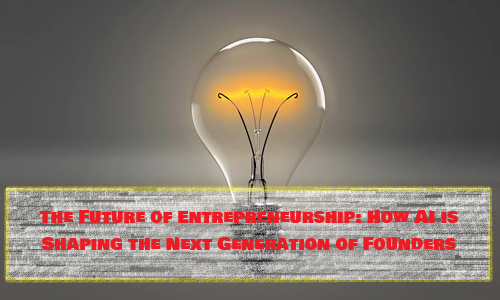The Future of Entrepreneurship: How AI is Shaping the Next Generation of Founders
Entrepreneurship has always been about vision, creativity, and resilience. But today, it’s entering a new era—one profoundly influenced by the rise of Artificial Intelligence (AI). From ideation to execution, AI is transforming the way startups are founded, managed, and scaled. This seismic shift is not just about automation or efficiency; it’s about reimagining entrepreneurship itself. In this article, we explore how AI is shaping the next generation of founders and redefining the future of business.
The AI Revolution Meets Entrepreneurship
Artificial Intelligence, once confined to sci-fi and research labs, is now embedded in everyday business operations. Machine learning algorithms, natural language processing, and intelligent automation are increasingly accessible, even to small startups with limited resources. This democratization of AI technology means that entrepreneurial innovation is no longer the privilege of a few tech giants — it’s an open frontier for creators worldwide.
Startups today are leveraging AI in ways that fundamentally alter the traditional entrepreneurship model. This ranges from smarter market research to personalized customer engagement and even AI-driven product development.
AI-Powered Idea Generation and Validation
One of the earliest hurdles for any entrepreneur is generating viable business ideas and validating them before committing resources. AI tools are now stepping in to revolutionize this phase.
- Market Analysis: AI can analyze vast amounts of data — social media trends, consumer behavior, competitor moves — within seconds. This real-time intelligence helps founders identify gaps and emerging opportunities that humans might overlook.
- Predictive Analytics: Using historical data, AI models predict market demands and customer preferences, enabling entrepreneurs to tailor their products or services with higher confidence.
- Idea Validation: AI-powered platforms simulate consumer responses or run automated A/B testing, significantly reducing the risk of launching untested ideas.
The net effect? Faster, data-backed decision-making that increases the likelihood of success.
Smart Automation in Operations
Running a startup involves juggling countless tasks, from customer support to inventory management. AI-driven automation is liberating founders from routine operational burdens.
- Chatbots and Virtual Assistants: These tools handle customer queries 24/7, freeing up human resources for more complex tasks.
- Process Automation: AI algorithms streamline supply chains, accounting, and scheduling — reducing errors and improving efficiency.
- Personalized Marketing: AI platforms analyze customer data to deliver tailored campaigns, increasing conversion rates and brand loyalty.
By automating repetitive work, entrepreneurs can focus on innovation, strategy, and growth.
AI-Enhanced Funding and Financial Management
Funding remains a significant challenge for startups, but AI is changing the game in how entrepreneurs secure and manage capital.
- Investor Matching Platforms: AI-driven networks match startups with the most relevant investors, improving fundraising efficiency.
- Credit Scoring Algorithms: Alternative AI models assess startup creditworthiness more accurately, broadening access to loans and financial services.
- Financial Forecasting: AI tools provide predictive insights on cash flow, revenue, and expenses, helping founders plan better and avoid financial pitfalls.
With AI’s support, the financial landscape for startups is becoming more transparent and manageable.
AI as a Co-Founder: Augmenting Human Creativity
One of the most exciting frontiers is AI as a creative partner. Rather than replacing founders, AI acts as an augmentation tool, amplifying human ingenuity.
- Design and Prototyping: Generative AI can produce product designs or software code snippets based on brief inputs, accelerating the prototyping process.
- Content Creation: From marketing copy to video scripts, AI tools help entrepreneurs craft compelling narratives faster.
- Decision Support: AI-driven analytics provide real-time insights and scenario modeling to guide strategic decisions.
This synergy allows founders to iterate rapidly, experiment boldly, and respond agilely to market feedback.
Democratizing Entrepreneurship: AI Lowers Barriers to Entry
Historically, launching a startup required significant capital, technical skills, and connections. AI is changing that.
- No-Code/Low-Code AI Platforms: Entrepreneurs without coding expertise can build intelligent apps and websites using AI-powered tools.
- Accessible Expertise: AI-powered mentoring platforms provide personalized business advice, leveling the playing field for first-time founders.
- Global Reach: AI enables market research and customer engagement across geographies and languages, expanding entrepreneurial opportunities worldwide.
As a result, AI is broadening who can become an entrepreneur, fostering diversity and innovation.
Ethical and Practical Challenges
While AI offers immense promise, it also introduces new challenges for the entrepreneurial ecosystem.
- Bias and Fairness: AI models trained on biased data risk reinforcing inequalities or unfair practices.
- Data Privacy: Startups must navigate complex regulations and ethical considerations when using customer data.
- Dependence Risk: Over-reliance on AI might limit human judgment and creativity or expose startups to systemic vulnerabilities.
Successful entrepreneurs of the future will need to balance AI’s power with responsibility, transparency, and ethical foresight.
Real-World Examples of AI-Driven Startups
- Zest AI: Using machine learning, Zest AI helps lenders make fairer credit decisions, improving access to finance for underserved markets.
- Lemonade: An insurance startup leveraging AI chatbots and claims processing to offer faster, cheaper policies.
- Runway ML: Provides creative professionals with AI tools for content creation, showcasing how AI supports creative entrepreneurship.
These examples highlight the diversity of AI applications and inspire the next wave of AI-powered founders.
What Future Founders Should Prepare For
As AI continues evolving, future entrepreneurs should develop a hybrid skill set:
- AI Literacy: Understanding AI capabilities and limitations to effectively integrate it into their ventures.
- Data-Driven Mindset: Making decisions grounded in analytics and insights.
- Adaptability: Embracing continuous learning as AI tools and markets shift rapidly.
- Ethical Leadership: Ensuring AI is deployed responsibly and inclusively.
Building these competencies will be essential to thrive in an AI-augmented entrepreneurial landscape.
Conclusion: Entrepreneurship Reimagined by AI
The future of entrepreneurship is not just about new technology but about how founders harness AI to create meaningful impact. From ideation to funding, operations to marketing, AI is a catalyst that lowers barriers, accelerates growth, and unlocks creativity. Yet, the human element remains irreplaceable—vision, empathy, and ethical judgment will continue to define entrepreneurial success.
As AI shapes the next generation of founders, entrepreneurship becomes more inclusive, innovative, and impactful than ever before. The startups of tomorrow will not just leverage AI — they will co-create with it, pioneering a future where human potential and artificial intelligence grow hand in hand.



